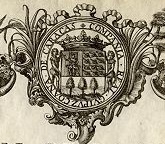History
Conquerors and settlers
Juan Pérez de Tolosa, judge of residence for the zone of Venezuela and Cabo de la Vela, arrived in 1546 and restored the order in the cities of Coro and El Tocuyo. His brother Alonso recognized what would be Trujillo. We should point out the first Simon Bolivar, from Zenarruza, royal clerk and secretary of the Real Audiencia of Santo Domingo, who from Santo Domingo passed, in 1589, to Caracas as the first perpetual regidor and procurator general. He was responsible for the creation of schools of first letters and a seminary of grammar directed by Juan de Arteaga and Simón de Basauri (1591). Captain Antonio de Berrio, a pearl seeker in Guayana, went down the rivers to the Orinoco where he founded San Jose de Oruña (1592) and Santo Tomás de Guayana (1593, later Angostura). The adventure of El Dorado (1561) began with Lope de Aguirre and Pedro de Ursúa as the protagonists and Barquisimeto as the end point of it. Already in the c. XVII, ranch owners, such as Francisco de Arrieta, Pedro Hernández de Galarza and Antonio Arraez de Mendoza in the Bobures Valley, Juan Félix de Arrúa in the Chama valley, etc. Among the governors and members of the Caracas chapter, Basque's surnames such as Alquiza, Hernani, Oñate, Aguirre, Hoz de Berrio, Ybarra, Bolívar, Lezama, Arguinzoniz, Zabala, Arechederra, Mendoza, Arteaga, Múxica and Butrón, Villela, Echeverria, Landaeta, Guevara, Zuazo, Arraez, Ochoa, Bera settled on the city. In Barinas, the Ochagavía, in Barquisimeto the Ansola, in Mérida the Uzcategui, etc. In the fight against the Dutch pirates of the first third of the century, Navarre Lope Díaz de Armendáriz (Marquis of Cadreita), Admiral Manuel de Redín and his brother, Captain Tiburcio Redín, entered Capuchin in 1637 and died in 1651 in La Guaira. [1]
Capuchin missionaries
They were part of the white population penetration, for which they learned the aboriginal languages. In 1672 Francisco de Puente la Reina and 10 other friars, passed to Cumaná where they resided during 40 years. This Navarrese founded the Conversion of the Christian Doctrine for the Chaima Indians. Francisco Javier de Alfaro (Manuel Frías) moved from the convent of Los Arcos to Maracaibo; wrote a catechism for each group of native coianos, chaques and anatomists. Nicolás de Renteria missioned in Los Llanos in 1663. Antonio de Idiazabal arrived in Venezuela in 1672 and died, ill, in Cumaná. [2]
Real Compañía Guipuzcoana de Caracas

It was the most important mercantile company of its time (1728–1785); Its objective to displace the Dutch from the Venezuelan cocoa trade (also tobacco and hides). The royal permit authorized the Guipuzcoans based in San Sebastian to bring it in exchange for carrying their own merchandise from Pasaia and Cádiz and to pay a canon to the monopolistic port of Cádiz. The main factor in Caracas was Pedro de Olavarriaga. Factories were opened in La Guaira, Caracas, Puerto Cabello, San Felipe, Maracaibo, Cumaná and Guayana. Not only did he carry goods from Gipuzkoa, but also supplies and troops and enabled his own ships to defend Venezuela from the English attacks, a war in which Blas de Lezo was distinguished. It was due to the colonization of Cumana and several fishing trials. The Basques established in Venezuela continued colonization mainly in the valleys of Aragua, in the plains of Cojedes, Portuguesa, Orinoco and coasts of Caracas. They introduced, among other things, the indigo of dye, the cotton and the sugar cane. The free trade declaration of 1778 and the English harassment determined its closure. The link with Pasaia-San Sebastián remained until the end of the century. [3]
Second wave of Basque immigration
In 1939 as a result of the Spanish Civil War, begins the arrival at Venezuelan ports of what is considered the largest migration of Basques to Venezuela since the colonial period. With the support of the Basque Government in exile, the Venezuelan Government of General Eleazar López Contreras and with the approval of a large number of Venezuelan intellectuals such as Arturo Uslar Pietri and Antonio Arraíz, on June 24 of the same year, 82 Basques addressed the Transatlantic "Cuba" in the French port of Le Havre departing for Venezuela under the notes of the Txistu de Segundo de Atxurra who interprets the Agur Jaunak, many of them never returning. The arrival of this first contingent was an event in the Caracas of the time and the local press echoed the same dedicating some reviews, in the same it is mentioned that on Sunday July 6, 1939 after hearing Mass in the Church of Santa Rosalía in the city of Caracas, the group accompanied by Arturo Uslar Pietri and Simón Gonzalo Salas made a wreath to the remains of the Liberator Simon Bolivar in the National Pantheon, singing the Agur Jaunak, the National Anthem of Venezuela and the Eusko Abendaren Ereserkia, creating this last great controversy since some media criticized this, erroneously, for having been interpreted communist hymns in the national pantheon, a situation that was not taken into account by the Venezuelan Government. To this first contingent others occurred almost consecutively and with a larger number of people.
